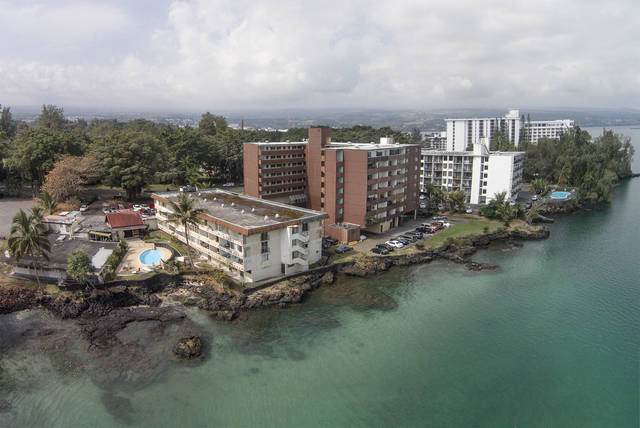The state Senate rejected the last remaining Banyan Drive redevelopment bill Tuesday following the return of broad language intended to help extend land leases for Mauna Kea observatories. ADVERTISING The state Senate rejected the last remaining Banyan Drive redevelopment bill
The state Senate rejected the last remaining Banyan Drive redevelopment bill Tuesday following the return of broad language intended to help extend land leases for Mauna Kea observatories.
The bill was referred back to a conference committee, allowing it to be heard again next year, but also sinking any chance of it passing before the 2017 legislative session ends today.
While the legislation would have created a state-supported Waiakea Peninsula redevelopment district, and allocated $500,000 to the effort, it also contained sections pertaining to public land leases statewide.
Those would have allowed all leases of state land to be extended beyond the 65-year limit if the lessee makes substantial improvements or if hit by a natural disaster. That prompted concerns from environmentalists and at least some senators that leases could be extended in perpetuity without going back to a public auction.
Rep. Richard Onishi, who introduced House Bill 1469, acknowledged that language was meant to help the University of Hawaii at Hilo extend its master lease for the Mauna Kea Science Reserve, though it didn’t refer to it specifically. That agreement, covering the existing observatories and the proposed Thirty Meter Telescope, ends in 2033. Under existing law, the university has to seek a new master lease from the state Board of Land and Natural Resources.
Onishi, D-Hilo, Kurtistown, Volcano, said he didn’t want that process to be tied up in courts.
“Look at what’s happening with TMT now,” he said, referring to legal setbacks. “TMT should have been built years ago.”
TMT opponent Kealoha Pisciotta said she was appalled such language would be slipped into a bill while the $1.4 billion project’s contested case hasn’t finished. She said that would have undermined the protection of public trust lands and the state constitution. It was not clear if the university or the observatories requested the legislation.
“This is a prime example that if the foundation lacks integrity, then the building has no strength,” she said.
Meanwhile, lawmakers passed a separate bill, HB 575, allowing commercial and industrial leases with less than 10 years remaining to seek an extension if no one else is interested in the property. It also allows schools or government entities to have a lease extended without a public auction, though it specifically prohibited that from applying to the observatories.
Onishi said he declined to consent to a floor amendment for HB 1469 to remove the lease extension language for that reason.
“They carved out the university, and I said that’s not acceptable,” he said.
The Senate had taken that language out of the bill earlier this session, but a conference committee made of House and Senate representatives agreed to put it back in Friday.
The committee included Sen. Kai Kahele and Onishi, who both voted in favor of the final version, according to the Legislature’s website.
Kahele, D-Hilo, said he shared concerns about the language but voted to move it out of conference to keep it from missing a deadline.
“At that point, it was all or nothing,” he said.
Kahele introduced his own legislation to create a state redevelopment district for Banyan Drive, located on the Waiakea Peninsula in Hilo, but wasn’t successful.
Onishi’s bill also would have allowed the redevelopment district to receive half the state’s revenue from properties in the area.
Hawaii County kick-started this effort by creating its own redevelopment district, with an appointed board, though it doesn’t have the ability to raise funds or control land leases.
Board member Brian DeLima said the group would continue to talk with county officials and lease holders but options are limited without funds for an environmental assessment. He said that could cost more than $500,000 for a redevelopment plan.
“We need to work with the administration, planning department and community to find a way to move forward,” DeLima said.
The area is home to Liliuokalani Gardens, a golf course and several hotel and condo properties, some of which have seen better days. The state is the largest landowner.
Gordon Takaki, Hawaii Island Chamber of Commerce vice president, said the redevelopment bills had a lot of support from the Hilo community.
“Obviously, we are very disappointed,” he said. “There was a lot of work done.”
Reporter Ivy Ashe contributed to this report.
Email Tom Callis at tcallis@hawaiitribune-herald.com.




